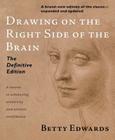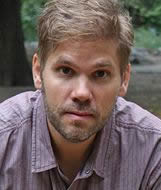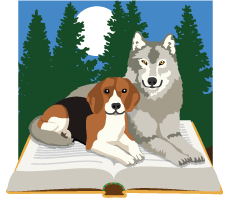|
|
| |
|
 |
|
|
|
|
 Jen Jen |
|

|
 |
Drawing on the Right Side of the Brain
by Betty Edwards.
I've been wanting to be able to draw birds for some time. I mentioned this to my friend, artist/teacher Dawn Rossbach, who is also the illustrator of The Cookie Garden. Dawn recommended I try Drawing on the Right Side of the Brain. I'm not very far into the book yet, but I'm really enjoying it so far and hopefully learning to draw using my right side of my brain! |
| |
|

|
|
Destiny of the Republic: A Tale of Madness, Medicine and the Murder of a President
by Candice Millard
This nonfiction history/biography of President Garfield, his would-be assassin Charles Guiteau, and the prevailing knowledge of medicine and science (Alexander Graham Bell plays a prominent role) make for a fascinating read. Garfield was shot in July of 1881, but did not die until September. The gunshot wound was not fatal, but the lack of the medical community's understanding of infection was and it led to a very slow, painful death. Millard is such a fine writer that I felt a great sense of sadness when Garfield died, despite that I knew he was going to die and even if he'd never been shot, he'd certainly be dead by now anyhow. I also felt a lot of sadness about Guiteau—his ignored mental illness and the method of his execution. If Millard's name looks familiar, you may be familiar with her book River of Doubt about Theodore Roosevelt. Her next book, Hero of the Empire, will be out in September, and it's about Churchill.
|
| |
|
 |
|
Medicine Walk
by Richard Wagamese.
I've just started Medicine Walk. I'm excited to delve into the work of a new-to-me author and to discuss it at Sister Wolf book group. Members of the group who have already read the book are raving about it. |
| |
|
|
|
|
|
|
|
 Sally Sally |
|
 |
|
|
|
|
| |

|
|
LaRose
by Louise Erdrich
Landreaux Iron stalks a deer, aims, sees a sudden movement as he fires, and the deer bounds away. He has shot and killed the 5 year-old son of his neighbors, the best friend of his own 5 year-old son.
Landreaux turns to tradition for guidance and, after a sweat lodge, he and his wife Emmaline know they must follow an ancient custom and give their youngest child, 5 year-old LaRose, to the family of Dusty, the boy whom Landreaux killed. “Our son will be your son now,” they say.
Before Dusty’s death, the families had been good neighbors. Dusty’s father, Peter, was Landreaux’s close friend and hunting buddy; Emmaline and Dusty’s mother, Nola, were half-sisters. Their children played together and the families shared rides, food, and clothing.
As we enter the world of these two grieving families, we learn the stories of the four parents and their children, as well as members of their extended families and community. After a period of time living in Peter and Nola’s home, LaRose begins to move between his two families. Very gradually, healing begins.
One of the older children living with Landreaux and Emmaline is actually the son of another man, Romeo. He and Landreaux were close friends in boarding school, until a falling out which left Romeo with a desire for vengeance. As he connives to hurt Landreaux, the healing of the grieving families is threatened.
The book tells a powerful story of loss, justice, and the mysteries of the human heart. It’s also a great story, beautifully written, and full of humor. With Erdrich’s earlier books, The Plague of Doves and The Round House, LaRose completes a thematic trilogy of novels exploring the theme of justice.
Editor’s note: this review is taken from an article Sally wrote for the May 28 edition of the Park Rapids Enterprise.
|
| |
|

|
|
Wintering
by Peter Geye
  Peter Geye can’t write fast enough for me—I’ve been waiting for this book since finishing The Lighthouse Road three years ago. There was some ambiguity about the ending of that book. Wintering answered my questions about just what happened in the earlier book, but the story stands on its own. Geye’s books are set in far northern Minnesota, and they are written about people and situations we can relate to. In Wintering Gus’ father, old Harry Eide, disappears from his sickbed. Townspeople search for him, but Gus knows his father won’t be found. Gus seeks out Berit Lovig, Harry’s longtime companion, and, over time, tells her the story of the trip Harry took him on in 1963, when Gus was 18. Harry claimed to have maps of the early voyageurs, and said they’d trace their steps in the Peter Geye can’t write fast enough for me—I’ve been waiting for this book since finishing The Lighthouse Road three years ago. There was some ambiguity about the ending of that book. Wintering answered my questions about just what happened in the earlier book, but the story stands on its own. Geye’s books are set in far northern Minnesota, and they are written about people and situations we can relate to. In Wintering Gus’ father, old Harry Eide, disappears from his sickbed. Townspeople search for him, but Gus knows his father won’t be found. Gus seeks out Berit Lovig, Harry’s longtime companion, and, over time, tells her the story of the trip Harry took him on in 1963, when Gus was 18. Harry claimed to have maps of the early voyageurs, and said they’d trace their steps in the  wilderness, but gradually a hidden agenda for the trip emerged. Both Harry and Gus are tested in the wilderness, and it’s an experience Gus has never forgotten. The story is haunting and Geye’s writing is beautiful. wilderness, but gradually a hidden agenda for the trip emerged. Both Harry and Gus are tested in the wilderness, and it’s an experience Gus has never forgotten. The story is haunting and Geye’s writing is beautiful.
I’m thrilled that Peter will be at Author Fest with us on June 18. It’s a great chance to meet him and talk to him about his books!
|
| |
|

|
|
Medicine Walk
by Richard Wagamese
Sixteen-year old Franklin Starlight lives a simple life on a farm in British Columbia with an old man to whom he is not related. When Franklin is summoned to visit his father, Eldon, he has mixed emotions. He has spent very little time with his absent, neglectful father, an alcoholic whose promises were rarely kept. When Franklin reaches his father, Eldon is close to death after years of hard drinking. He wants to die and be buried in the warrior way, and asks Franklin to take him into the wilderness. Franklin chooses to honor his father’s wishes, and the two begin a difficult journey by horseback. As they travel, Eldon tells his son the story of his life, giving Franklin a sense of his own history that he’s never had. It’s a coming of age story, a quest story—but so much more. I’ll be thinking about this book for a long time.
Richard Wagamese is a writer whose work is well known in Canada. Milkweed Editions has just begun releasing his books in the United States—and I want to read more of them! |
| |
|
|
|
|
|
| |
|
|
|
|

Ann |
|
 |
|
Some Luck
by Jane Smiley
Some Luck follows the lives of Walter and Rosanna Langdon and their children from the 1920s until the early 1950s. Walter and Rosanna make their home on a farm in Denby, Iowa. Each chapter of Some Luck describes one year, sometimes focusing on a particular family member or event. The story gives readers a sense of life in rural Iowa in the early to mid-twentieth century. As the Langdon children grow up and make lives for themselves, we gain a sense of historical and cultural events affecting the country and the world. The story's strength lies in its characters and how they navigate everyday life. I found myself drawn to the Langdons. I'm looking forward to finding out more about where life takes this family in Early Warning and Golden Age, the books that follow Some Luck in Smiley's The Last Hundred Years Trilogy.
|
| |
|
|
|
|
|
|
|
| |
|
|
|
|
|
|

Bob |
|
 |
|
Weather Experiment
by Peter Moore
Weather forecasting…..really? Oh please, as if the Weather Channel isn’t bad enough with all those numbers rolling by for places that aren’t even close to me! But still, weather is all around. So I start reading and on page 1 it says, “These forecasters are in fact the product of one of the most notorious and daring scientific experiments of the nineteenth century.” Notorious? Daring? Weather guys? All right…I’ll bite.
So this book is about starting with nothing. No words to describe weather. No science to explain weather. No way to communicate what the weather is like here to someone who is 20 miles away and no method to keep track of weather and see trends so weather can be predicted. Now we complain about long range weather forecasting, but we know a lot more than they did in the early 1800s, which was nothing. So here’s how it all came about and actually, it’s not a bad story. The book is broken down into basically two parts, one figuring out the science, like barometric pressure and how it can help predict fair or foul weather and two, quickly communicating that information to others. There are lots of stories thrown in along the way of “scientists” who performed experiments that made me cringe. One of my favorites is about two fellows who took a light air balloon up to 35,000 feet, sort of by accident, without supplemental oxygen (by comparison, Everest is about 29,000 feet) and lived to tell about it.
An interesting book with lots of good information about how we got to where we are today starting from…..nothing. |
| |
|
|
|
|
|
|
|

Gail |
|
 |
|
|
|
|
| |

|
|
Eighty Days: Nellie Bly and Elizabeth Brisland's History Making Race Around the World
by Matthew Goodman
I had heard the name Nellie Bly but didn't know her story. Nellie was a news reporter for the New York Herald. She proposed to her boss that she would sail around the world in less than 80 days and she would beat Philias Fogg's record in Jules Berne's novel Around the World in 80 Days. As she was ready to set sail, the owner of Cosmopolitan Magazine decided to send one of his female journalists around the world in the opposite direction. The race was on! The book is described as narrative history. It's written in story form but with historical information too, and includes what life was like in the 1890's. The amazing thing is that Nellie only took one bag on her journey!
|
| |
|

|
|
Squashed
by Joan Bauer
16 year-old Ellie is growing a giant pumpkin for competition in the Rock River, Iowa Pumpkin Weigh-in. If Max, the pumpkin, can gain 200 pounds and Ellie could lose 20 pounds, life would be perfect. That is, if she could get Wes, the new boy in town, to look her way. This is a good young adult book that older folks will enjoy, too. |
| |
|

|
|
Calling Invisible Women
by Jeanne Ray
Clover knows she no longer turns heads the way she used to and she's really only missed when dinner isn't on the table on time. Then Clover wakes up one morning and she really is invisible! |
| |
|
|
|
|
|
|
|

Hannah |
|
 |
|
|
|
|
| |
 |
|
Hemingway in Love: His Own Story
by A. E. Hotchner
This is a bittersweet memoir by the friend Hemingway's entrusted with stories he could not write himself. Hemingway ("Papa" to his friends) shared his pain and regrets with Hotchner, who held off on publishing them until Mary, Papa's wife in his last tragic years, was gone and could not be hurt by the revelation that Hadley was the true love of Hemingway's life. This book traces the arc of that life, from the Paris days to the description of two back-to-back African plane crashes and the eventual electro shock treatments that failed to stop Papa's suicide. Reading this gave me a whole new understanding of Hemingway, but also made me think about the secrets that larger than life people hold, and about what makes a life well lived.
|
| |
|

|
|
Junky: The Definitive Text of "Junk"
byWilliam S. Burroughs
This definitive description of the world of addicts in 1950s US and Mexico was based on Burroughs' experiences, and is said to be semi-autobiographical, but describing his life only as it relates to drugs. Burroughs, a friend of Jack Kerouac and Allen GInsberg, had degrees in English literature and anthropology from Harvard. His skills in observation and his writing are remarkable. But based on this book, he seems to have been a horrible person. It's an interesting read, and this edition provides fascinating extra material.
|
| |
|

|
|
Monkey Grip
by Helen Garner
Nora is a 1970s Australian hippy, living among friends, including artists, and her precocious five-year-old daughter. The adults all take various drugs and bed partners. Nora is in love with a junky. Her feelings for him careen between anger and acceptance, joy and despair, tenderness and revulsion, disappointment and hope. The moments of hope are minor and fleeting, because she knows she can't count on him for anything at all. I'll never understand why people do these things to themselves, but these characters are so real that it's as close as I'll get. And Garner's language is sometimes dazzling. |
| |
|
|
|
|
|
| |
|
|
|
|
 Iain Iain |
|
 |
|
Armada
by Ernest Cline
Armada is a science fiction tale following Zach Lightman, a high school student and a player of the video game Armada, a world renowned alien invasion simulator. When aliens from the game suddenly invade the real world, Zach and other top players of the game are quickly recruited by a secret branch of the military to fight the invaders. Filled with great music and movie references, Armada is a great choice for gamers and sci-fi fans alike. |
| |
|
|
|
|
|
| |
|
|
|
|

Liz
|
|

|
|
Ordinary Grace
by William Kent Kreuger
The summer of Frankie’s thirteenth year is a summer full of death, loss, and mystery. Faced with this, his seemingly idyllic childhood comes to an abrupt end, and his life will never be the same. In spite of (or because of) the great tragedy, the humanity and hope shine through in this amazing story. I have to say this book not only met, but surpassed my high expectations for it! If you haven’t read it yet, you definitely should. It is a must read. |
| |
|
|
|
|
|
— page top —
|
|



 Jen
Jen Sally
Sally





 Iain
Iain
 wilderness, but gradually a hidden agenda for the trip emerged. Both Harry and Gus are tested in the wilderness, and it’s an experience Gus has never forgotten. The story is haunting and Geye’s writing is beautiful.
wilderness, but gradually a hidden agenda for the trip emerged. Both Harry and Gus are tested in the wilderness, and it’s an experience Gus has never forgotten. The story is haunting and Geye’s writing is beautiful. 